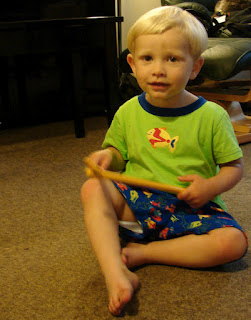Am I ready for piano lessons?
I’ve been asked before, many times, at what age I think children should start musical training. And I know that what people are really asking is “When should we start piano lessons?” But really, musical training starts as soon as a child is able to hear: in utero, before the child is even born. Because the initial part of musical training is all about listening to music. A baby’s brain is learning how to make sense of sounds. This is true for speech, environmental sounds, and, of course, music. It’s unclear how much babies can hear in the womb, or what sense they make of sounds, but babies are certainly born able to understand pitch and rhythm. And as they listen to music over the first few years of their lives, they become “enculturated”, meaning they learn to recognize and enjoy the basic norms of the music of their culture. For example, children enculturated to Western music prefer tonal music over atonal, and can recognize when out-of-key chords are inserted into songs.
Baby Music Classes?
But what about taking actual music classes – at what age is that really worthwhile? Should parents just listen to music at home with their infants and toddlers, or is there extra benefit from taking a music class? A recent paper from Laurel Trainor and colleagues at MacMaster University in Ontario describes research showing that babies gain a lot from participating in music classes. The 6-month study looked at infants who were 6 months old at the beginning of the experiment, and 12 months old at the end. The babies were split into two groups: one group participated, along with their parents, in a music class (including movement, singing, and playing rhythm instruments), while the second group participated (again with their parents) in a play-based class where music was playing in the background.
But what about taking actual music classes – at what age is that really worthwhile? Should parents just listen to music at home with their infants and toddlers, or is there extra benefit from taking a music class? A recent paper from Laurel Trainor and colleagues at MacMaster University in Ontario describes research showing that babies gain a lot from participating in music classes. The 6-month study looked at infants who were 6 months old at the beginning of the experiment, and 12 months old at the end. The babies were split into two groups: one group participated, along with their parents, in a music class (including movement, singing, and playing rhythm instruments), while the second group participated (again with their parents) in a play-based class where music was playing in the background.
This study showed three main results:
1) The babies who had attended the music class for six
months more strongly preferred tonal music over atonal music compared
to babies in the play class. This
indicates that music classes had helped the babies become more enculturated;
they had a better understanding and preference for Western tonal music than the
other babies.
2) Musical tones were processed differently by the brains of
babies who had attended music class. This was shown by EEG recordings, which use
electrodes pasted on the babies' heads to measure brainwave activity. Actively participating in a music class led
to the babies being better able to process musical sounds.
3) Parents of babies who had attended the music class
reported that their children had more positive social interaction with them,
were easier to soothe, and showed more smiling and laughter, compared to
reports from parents whose babies participated in the play classes.
Definitely ready for rhythm instruments
Wednesday mornings are one of my favourite times of the
week. I teach a class called Music Pups, in which I get to sing, dance, twirl, jump, play
rhythm instruments and just be generally silly, with a group of adorable little
ones and their happy parents. I’ve been
teaching this class for years, ever since my son was a baby, and I love
it. So I didn’t need to read a research
paper to convince me that music classes for infants are worthwhile. Even the littlest ones babble along with the
music, and shake instruments, and laugh and coo when their mothers dance with
them. The class is designed for a mixed
age: babies to four-year-olds. I’ve
had children who have taken the classes over a number of years and so I’ve been
able to watch their musical development.
It’s amazing to see these toddlers begin to sing along easily with their
favourite songs, to echo back (on pitch!) little musical phrases, and to beat
their drums in time to the music. Some
of these kids are now my piano students and it’s obvious that the
early music classes give them an edge.
But more than that, this type of music class helps reinforce a love for
music and give the children an early taste of what music teachers really want
to impart to their students: the joy of
music-making.
Reference
Trainor, L.J., Marie, C., Gerry, D., Whiskin, E., and Unrau,
A. (2012). Becoming musically enculturated: effects of music classes for
infants on brain and behavior. Annals of the New York
Academy of Sciences 1252,
129–138.


